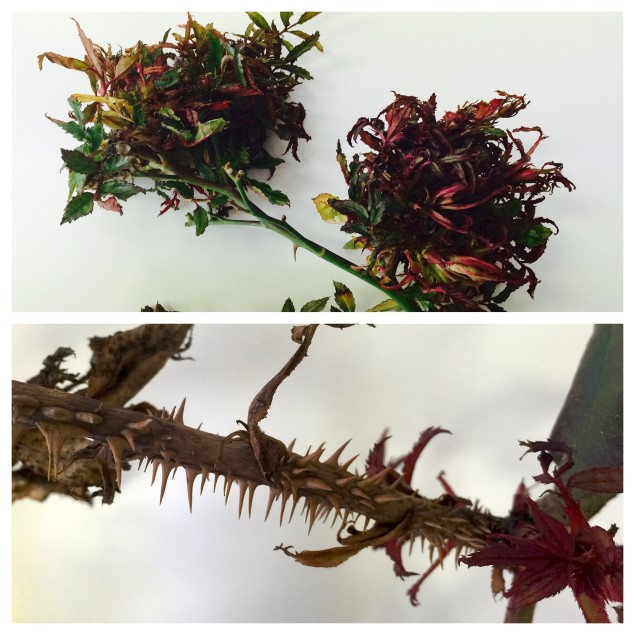Monoculture: The cultivation of a single crop in a given area. The term monoculture is the perfect word to describe what has happened to roses in Dallas. Over the last ten years, Knock Out roses have become a ubiquitous feature throughout Dallas landscapes. For good reason too: They’re the ultimate landscape plant. Unlike more finicky roses, Knock Outs require little care to thrive in our climate and soils. They’re tolerant of common rose disease like black spot and powdery mildew, bloom continuously and don’t have to be heavily pruned to do so. They’re a landscaper’s dream come true.
Yet, too much of a good thing can often come back to bite you. Knock Out roses are being knocked out all across North Texas by a devastating viral disease called Rose Rosette. The virus is transmitted to rose plants by a tiny mite named Phyllocoptes fructiphilus. The disease can infect all rose species and it spreads quickly. So it’s not so much that the Knock Out roses specifically are the target it’s just that there are so dang many of them now all across Dallas that the disease is able to proliferate exponentially at this all-you-can-eat rose buffet.

How do you know if your plants are infected? Now is a really good time to inspect them because you’ll very quickly be able to identify abnormal “witch’s broom” growth that is already active. You’ll see a big bunch of stems growing very tightly together along with dense clusters of abnormally long thorns. The foliage in the witch’s broom growth is a very deep red color and the abnormal thorns can also be bright red. Now, roses usually send out new growth that is red in color, but it’s the abnormally dense clusters of growth you need to watch for.
What can you do if your roses are infected? Yank them. All of them. IMMEDIATELY. Remember folks, this is a virus we’re dealing with. There’s no cure. The disease can take 1-2 years to kill your plant. So it’s tempting to think that extra fertilizer, soil amendments or other treatments are going to get your roses through this problem. But, they won’t. They’ll just delay the inevitable. In the mean time, you’ll be spreading the disease to all of your neighbor’s roses, and so on and so forth. The responsible thing to do is pull the plants out as soon as you diagnose the problem. Know that the virus can survive on small pieces of root left behind from infected roses. So realize that if you replant new roses in the same bed, you can infect your new plants. Also, if your neighbor has rose rosette, your new roses will most likely become infected.
While I always promote composting your garden waste, most homeowners don’t achieve high enough temperatures necessary to kill off the virus in their compost. The safest thing to do is remove plants completely from your property. Living Earth, a local mulch and soil company, also recommends bagging the plants for trash pick-up due to the presence of mites on the plants.






